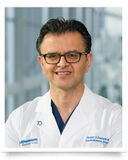“What About Exercising After Heart Valve Surgery?” Asks Brent
By Adam Pick on July 9, 2014
I received a great question from Brent about exercise after heart valve surgery. In his email, Brent writes to me, “Adam – I’m an active guy who likes to play racquetball, swim, hike, bike, golf and bowl. I was diagnosed with severe aortic stenosis and recently told I need surgery. I feel pretty darn good at 66 even though I do get winded a little easier these days. How long after surgery can I do all the things I’m doing now? Is there anything I should do after surgery to help me exercise sooner than later? Thanks, Brent”

To provide Brent a great answer, I contacted Dr. Rawn Salenger, a heart valve surgeon from the University of Maryland, who has a clinical interest in how patient recovery from heart surgery. So you know, Dr. Salenger is an incredibly nice guy, who has successfully operated on many patients from our community including Kathleen Ryan, Gene Bove and Jeffrey Moore.
In Dr. Salenger’s response to Brent’s question, he starts by discussing the advantages of heart valve surgery and the time needed for the sternum to heal:
The goal of aortic valve surgery is to improve your survival and your quality of life. You should be able to get back to doing everything you are doing now and likely will have increased exercise tolerance. The rule of thumb is to wait three months before engaging in the activities including racquetball, swimming, hiking, biking, golfing and bowling. The main reason for that is to allow sternal (breast bone) healing. At three months, the sternum is mostly, although not entirely, healed.
Then, Dr. Rawn Salenger discusses the importance of walking after surgery:
Early after surgery, usually the next day, patients start to walk with assistance. This progresses to walking independently which will likely occur for you prior to discharge from the hospital. Walking inside and outside is encouraged for the next several weeks. Daily walks are great and you should stop when your body tells you to – don’t push yourself too hard. Beginning 4-6 weeks after surgery, your cardiologist can release you to begin a formal outpatient cardiac rehabilitation program. This entails exercising under the supervision of professionals and the program is designed to safely transition you back to an active lifestyle.
Lastly, Dr. Salenger addresses the benefits of cardiac rehab:
Cardiac rehab is recommended for all patients except in the uncommon situation where there is a medical reason not to exercise. To be safe, patients should be checked by their cardiologist and cleared prior to enrolling in a rehab program. Overall, patients who attend cardiac rehab are more active long term which is beneficial. The rehab program may be too easy for some patients who are in great shape but it is still a safe, supervised way to get back into exercise. Based on your pre-operative level of activity, you should expect to be active for a long time after getting your new valve. Good luck!
Many thanks to Brent for his question and a special thanks to Dr. Rawn Salenger for sharing his clinical experience and research with our patient community.
Keep on tickin!
Adam
|
Patricia says on July 10th, 2014 at 7:27 pm |
|
Hi Brent, |
 |
|
Ron Bumpus says on July 16th, 2014 at 4:20 pm |
|
Hi Brent, Ron |
 |
|
Peter says on July 16th, 2014 at 4:58 pm |
|
Hi Brent – I am 54 and had my aortic valve replaced on 16th May. Like you I was very active pre-surgery (mainly jogging, MTB) and this helped y recovery immensely. I was up and walking 2 days after surgery and doing stairs after 3 days. I was discharged 5 days after surgery and then started at 20 minutes slow walks around the block by my house. After walking every day since then and gradually building up I now find 1hr quite easy and this is on hill country. I even did a 90 minute hike on some hill tracks last weekend. Today I intend to get on my mountain bike but I will be limiting this to relatively “on road” because I don’t want to risk falling off until at least 3 months after surgery. My own experience is that there are good days and bad days post-recovery ( I did end up in hospital again 3 weeks after surgery, for one night, with extremely bad shoulder pain, but this was attributed as being referred pain due to the nerves being unsettled from the surgery. This is gradually settling down). The key is to listen to your body and gradually increase activity “softly softly”, and certainly no major weight bearing stuff until at least 3 months. I use a Suunto HR monitor that gives me some guidance on programs and – because I tend to overdo things – tells me when to take a rest day!! Works for me. Good luck! Peter (New Zealand) |
 |
|
Alan says on July 16th, 2014 at 5:19 pm |
|
Hi Brent – I am 58 and had my aortic valve and 4 inches of aorta replaced on April 21. Before my surgery I was very active with much hiking and biking as well as pretty significant weight lifting. Now (eleven weeks post-op) I was hiking in the mountains of Colorado, rode a bike for half a day (on fairly level terrain), swam one day (a gentle breast stroke), worked out in the gym lifting weights (20 – 40 pounds depending on the movement) and all without pain and no shortness of breath despite the altitude. The last time I was in Colorado (before my surgery) I had severe breathing problems and passed out while skiing. I agree the secret is to get moving again as soon as possible, pace yourself, and get adequate rest. Walk, walk, walk. Definitely no weights until three months after surgery. |
 |
|
Michael says on July 17th, 2014 at 1:51 am |
|
I’m a bicyclist but not a very competitive one. I really didn’t want to go through the procedure of having my aortic valve replaced but did so when my cardiologist said that if I didn’t do it, I’d be selling my bikes in a few years because I would no longer be able to ride. I didn’t ride until they took me off coumadin since my cardiologist said that if I hit my head in a fall, the “results could be catastrophic.” I went through the same rehab that everyone else has described. Three months after surgery, I went on my first road ride, we did 22 miles and I noticed on my heart rate monitor that my heart beat was consistently lower than it had been before my surgery. It wasn’t that long when I was back in the saddle. I rode for quite a while until I did an endo on my mountain bike resulting in two fractures and a shoulder separation. Bones aren’t doing so hot I guess and the muscles aren’t as good as they used to be but the old heart just keeps pumping away. In the end, replacing that valve ended up making me a stronger rider. I wasn’t expecting that to happen but it did. |
 |
|
Bob Eldi says on July 17th, 2014 at 5:23 am |
|
Brent – I’m 72 & had a bovine aortic valve replacement in Feb. ’13 – I’m also very active – I walked a ton as soon as possible & resumed light weight leg exercises at 6 weeks – I’m not sure I’d golf or play racquetball until 6 months, but swimming, hiking, etc. should be fine. It’s the sudden twist that I avoided for 6 months – your body will tell you – good luck in the rehab – you will feel much better than before – Bob |
 |
|
Peter Bertolo says on July 17th, 2014 at 7:48 am |
|
Hi Brent |
 |
|
Anne Shannon says on July 17th, 2014 at 10:08 am |
|
Hi Brent, The patient you should look up is Barry Stone from NM. He had his AVR about two years ago and to read the list of accomplishment since surgery will be encouraging. Yesterday was the four anniversary of my new bovine valve. My quality of life has been excellent since that operation. Sending you many positive thoughts as you go through this process! Anne Shannon |
 |
|
Hi Brent says on July 17th, 2014 at 7:09 pm |
|
My name is Bob Stoltz and I had my aortic valve replaced when the diameter went from mild, medium to severe (1.2 cm to. .6 cm ). I followed it with echocardiograms for ten years with no problems of any kind. ( I always exercised, weights, bicycling, jogging etc) It did not change for the last two years, and the doctor thought it may have stabilized. It did not stabilize, and I had typical symptoms, shortness of breath, fatigue etc. I had the valve replaced on October 6 2013 with a Carpentier- Edwards Magna Ease aortic valve prosthesis. In January 2014 I was back to 60% of where was before the surgery.– and now July 2014 I am better than I was before my surgery. I jog 6mph on the treadmill for one hour each day.(I do cheat a little, hold on to side rails, to relieve some weight from my knees) |
 |
|
Peter Willard says on July 19th, 2014 at 12:35 pm |
|
I like reading about the people that had a valve replaced or are about to I had a bovine valve in Feb.2010 I am 72 and it would be nice to know what other valves people choose and why. |
 |
|
Ellie Mankin says on July 25th, 2014 at 12:05 am |
|
I have been diagnosed with A-FIB in 05/10/2013, heart failure on 12/12/2014, and 2 leaky valves (Tricuspic Valve and Mitral Valve) on 06/25/14. Prior to my heart failure, I am very active gardener, coffee farmer (Kona, HI), doing my own house cleaning, lots of party entertaining, etc., etc. I am of age 66 but my condition since 12/12/2014 had put a halt to my quality of life. I am on heavy medication of Lasix, Potassium HCL, Digoxin, Spironlactone, Xalreto, Atorvastatin, Metaformin (since 07/01/14), Tamoxifen (breast cancer survivor since 04/2010), stopped taking Metolazone (06/28/14 – ended 07/07/14). Is surgery the best solution to regain a much quality of life than loosing my breath, difficulty in exertive type of activity and so on. I also since I am placed on Lasix and Potassium, I am suffering from severe leg cramps nightly to the point where I am under anxiety tension due the constant pain and lack of sleep – leg cramps comes between 2:00am through 6:30am. Please give me a suggestion to to discuss with my cardiologist. |
 |
|
BOBS STOLTZ says on August 6th, 2014 at 9:29 am |
|
Hi Ellie, |
 |
|
BOBS STOLTZ says on August 6th, 2014 at 9:30 am |
|
Hi Ellie, |
 |
|
Rhonda Summerfield says on September 2nd, 2014 at 5:07 pm |
|
Hi Adam, Rhonda |
 |
|
DJ says on October 28th, 2014 at 5:49 pm |
|
I am nine months post aortic valve replacement surgery. Since I have some other issues to deal with, i.e., spinal and hip joint pain, I am not moving as fast I think I should be. Netther am I exercising as much as I want to. |
 |














